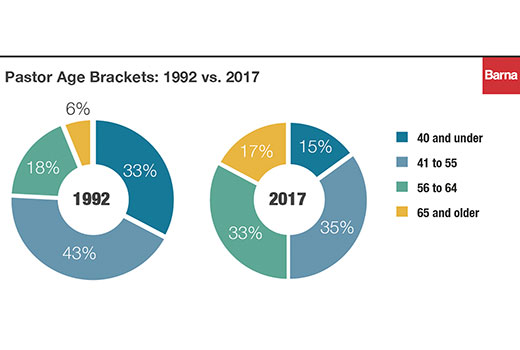America’s pastors aren’t getting any younger.
There are now more pastors over age 65 than under 40, a demographic shift over the past three generations that portends major challenges for the future church as baby boomer pastors age and die.

(Source: Barna Group)
According to a recent study by the Barna Group, the median age of Protestant pastors is 54; in 1992, it was 44. The graying of America’s pastors isn’t an immediate problem — as older pastors’ experience and wisdom remain a rich resource for churches — but it will become an issue as boomers age out of the pulpit and fewer millennials opt to follow traditional church ministry paths.
“Older pastors can offer an ongoing stability to the churches they serve,” said Monty Hale, a church development leader for the South Carolina Baptist Convention and former director of the convention’s pastoral ministries office. “In most cases, they have ‘been there and done that.’ Borrowing on their experience, they are able to move more confidently through the issues that confront pastors today.”
When George Barna published his findings 25 years ago in “Today’s Pastors,” the majority of all church leaders were in their 20s, 30s and early 40s. Today, just 22 percent are under 45.
The Barna study cited numerous reasons for the shift, which began as early as the late 1960s. Average life expectancy in 1968 was 66; today it is 76. Also, the number of pastors who choose ministry as a second career or are called to ministry later in life has been increasing over the past 20 years. Finally, the recession that began with the economic crisis of 2008 had a negative effect on retirement plans, and many pastors of traditional retirement age are not able to walk away from regular paychecks.
Hale noted that many pastors have not saved well or not paid attention to their retirement accounts and now find themselves in a time when they may have to live up to 30 years in retirement.
Thom Rainer, president and CEO of LifeWay Christian Resources, says another reason for delayed retirement is boomers’ perceptions of old age. “Most view old age beginning in the early 70s rather than 65,” he said.
Still, according to the Barna study, there aren’t enough younger pastors to replace the ones who will be retiring over the next several years. “It’s no surprise that seasoned leaders find it difficult to track down and train their successors when we consider the declining percentage of practicing Christians in each successively younger generation,” the report stated. “In addition, even faithful, kingdom-minded teens and young adults are increasingly attracted to vocations other than full-time church ministry, where their desire to make a difference can have a more entrepreneurial expression without the (real or perceived) institutional baggage of church.”
Rainer, writing at thomrainer.com, said he sees “potential crises looming” as many younger pastors and staff are “particularly reticent to move into the more established churches largely dominated by boomer pastors today.”
Still, Rainer sees hope for the future because boomer pastors want to serve as mentors to the next generation. “[Boomers] see their greatest hope for influence now in people rather than society and structures,” he said. “A related hopeful sign is that the millennials have a strong desire to be mentored. How can we get these two generations together?”

